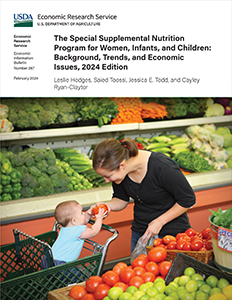The Special Supplemental Nutrition Program for Women, Infants, and Children (WIC): Background, Trends, and Economic Issues, 2024 Edition
- by Leslie Hodges, Saied Toossi, Jessica E. Todd and Cayley Ryan-Claytor
- 2/20/2024
Overview
The Special Supplemental Nutrition Program for Women, Infants, and Children (WIC) provides supplementary foods, nutrition education, and referrals to healthcare and other social service agencies to low-income, nutritionally at-risk women, infants, and children up to 5 years of age. Administered by the U.S. Department of Agriculture’s Food and Nutrition Service, WIC had an annual budget of $6 billion and served more than 6 million people each month in fiscal year 2022. The USDA’s Economic Research Service periodically reports on research findings relevant to WIC policy and program operations, often following major changes in the program’s design. This 2024 edition of the report explains how WIC works, discusses program trends, and summarizes research findings on key economic outcomes and policy issues facing the program. This report also outlines temporary changes to WIC in response to the Coronavirus (COVID-19) pandemic and the infant formula supply chain disruptions that occurred in 2022.
Hodges, L., Toossi, S., Todd, J. E., & Ryan-Claytor, C. (2024). The Special Supplemental Nutrition Program for Women, Infants, and Children (WIC): Background, trends, and economic issues, 2024 edition (Report No. EIB-267). U.S. Department of Agriculture, Economic Research Service. https://doi.org/10.32747/2024.8254669.ers
Download
-
Entire report
Download PDF -
Report summary
Download PDF

